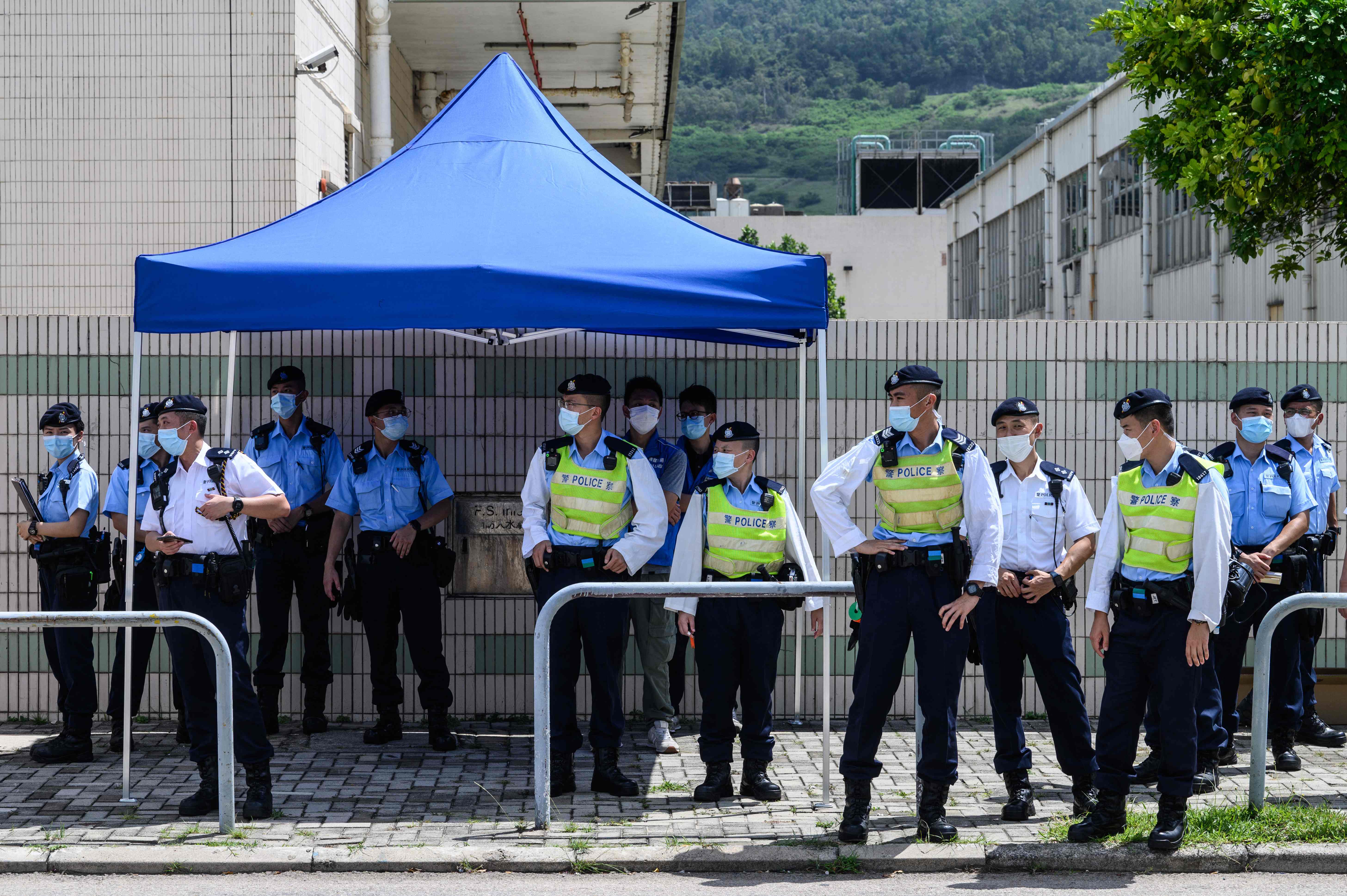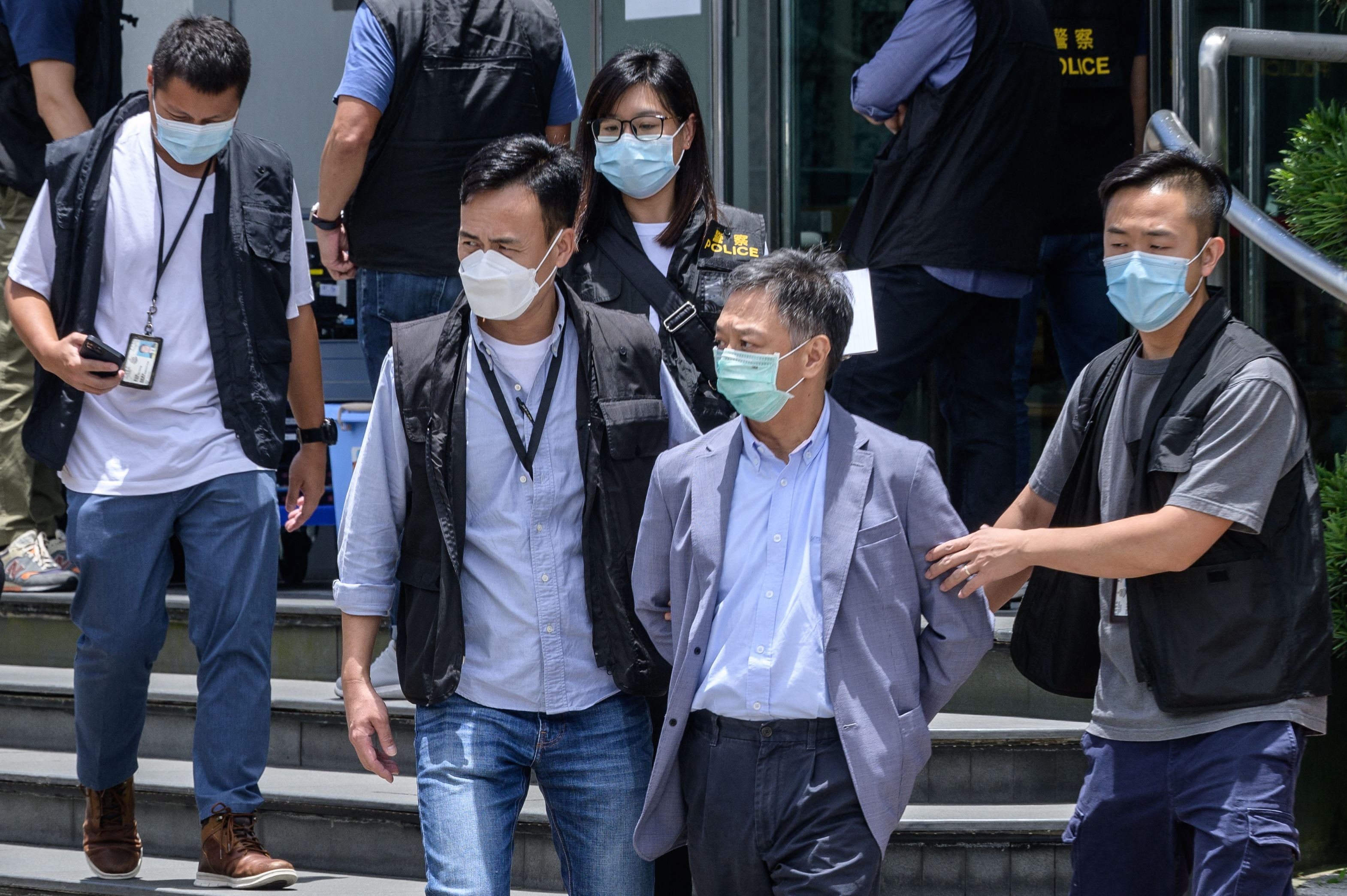‘Hanging by a thread’: Hong Kong newspaper warns over press freedom after police raid
Following the raid on their newsroom Apple Daily, Hong Kong’s biggest pro-democracy newspaper, told its readers it would ‘stand firm’

In a move that’s being seen as a warning shot to the island’s media organisations, hundreds of police from Hong Kong’s national security department raided Apple Daily’s newsroom on Thursday. Officers took dozens of computers, hard-drives, and other journalistic materials.
“They took away computers and checked messages on reporters’ computers and phones,” said Chris Yeung, the chairperson of Hong Kong Journalist Association (HKJA). “It raised concerns about the police’s access to journalistic materials. That should be protected and it’s vitally important to press freedom and the safety of sources.”
Police later claimed that dozens of reports published by the paper since 2019 have potentially violated the National Security Law (NSL), which came into effect last July. Notably, it marks the first time that articles published by media outlets have been cited as evidence of a crime under the new law.
Five executives from the paper were arrested, including its editor in chief. They were handcuffed and led away from their residence.
John Lee, Hong Kong’s secretary of security, said the raid and arrest were targeting those who use journalism as means to threaten national security. He accused the five executives of inciting foreign forces to impose sanctions on Hong Kong and China in the guise of journalistic work.
“Normal journalists are different from these people. Don’t collude with them,” he told reporters. “Do your journalistic work as freely as you like in accordance with the law, provided you do not conspire or have any intention to break... the national security law.”
Chris Yeung, the chairperson of Hong Kong Journalist Association, described Lee’s comments as a “political smear that labels the media as a political body. It reflects the fact that the raid and arrest are politically motivated”.
Apart from the raid and the arrests, police also froze US$2.32m of assets owned by three companies connected to Apple Daily.
A climate of self-censorship in Hong Kong
This is the second time that Hong Kong police have raided Apple Daily’s office in the last year. The paper’s founder, Jimmy Lai, is facing multiple charges and he is serving jail time for attending illegal assemblies. He has been in detention since late last year and his assets have also been frozen by the police under the NSL.
The Chinese-language tabloid paper, which combines celebrity gossip with investigative journalism, has been viewed as a bastion of press freedom in the city since the anti-extradition bill movement in 2019.
Following the first raid last year, the holding company of the paper saw its stock rise fourfold within days, as Hong Kong people bought the company shares in support of its pro-democracy cause.
Every news organisation now knows they can be raided, their computers can be seized and their most senior editors can be arrested
Additionally, the paper also printed more than 500,000 copies following the arrest of Mr Lai, which was five times its usual circulation in Hong Kong. On Thursday, the paper announced that they will print 500,000 copies for Friday, as it prepares for a possible surge of support from the public again.
In a letter to its readers, Apple Daily wrote that Hong Kong’s press freedom is now hanging by a thread. “Today’s Hong Kong feels unfamiliar and leaves us speechless. It feels as though we are powerless to stop the regime from exercising its power as it pleases,” the paper wrote.
“Nevertheless, the staff of Apple Daily is standing firm. We will continue to persist as Hongkongers and live up to the expectations so that we have no regrets to our readers and the times we are in,” they added.
Lokman Tsui, an assistant professor at the School of Journalism and Communication at the Chinese University of Hong Kong, says today’s operation is an outright assault on journalism and press freedom in Hong Kong.
“It is an attack on Apple Daily as a news organisation and it is also instilling a climate of self-censorship across the media community in Hong Kong,” he said. “The way they do that is to be unclear about what Apple Daily is violating. We don’t know what articles the police were referring to.”

Rather than going after other news organisations, Tsui thinks today’s move is to hold up Apple Daily as an example so that other news outlets understand the potential consequences of violating the NSL. “Every news organisation now knows they can be raided, their computers can be seized and their most senior editors can be arrested,” he said.
“Staff at Apple Daily have vowed to keep working and everyone is still closely watching how the situation will develop,” Tsui added.
Yeung from HKJA said the silver lining is that even in a place like China, where there is almost no room for press freedom, citizen journalists and other people are still trying to use the limited space to produce journalistic works.
“We are moving in that direction and the trend is worrying,” he said. “However, there are still a lot of people treasuring their jobs and trying everything possible under an extremely difficult environment.”
“Press freedom and a free society are vitally important to Hong Kong as a whole. I think Hong Kong will not be what it was if it’s no longer a city with free press and freedom of expression,” he added.
Join our commenting forum
Join thought-provoking conversations, follow other Independent readers and see their replies
Comments